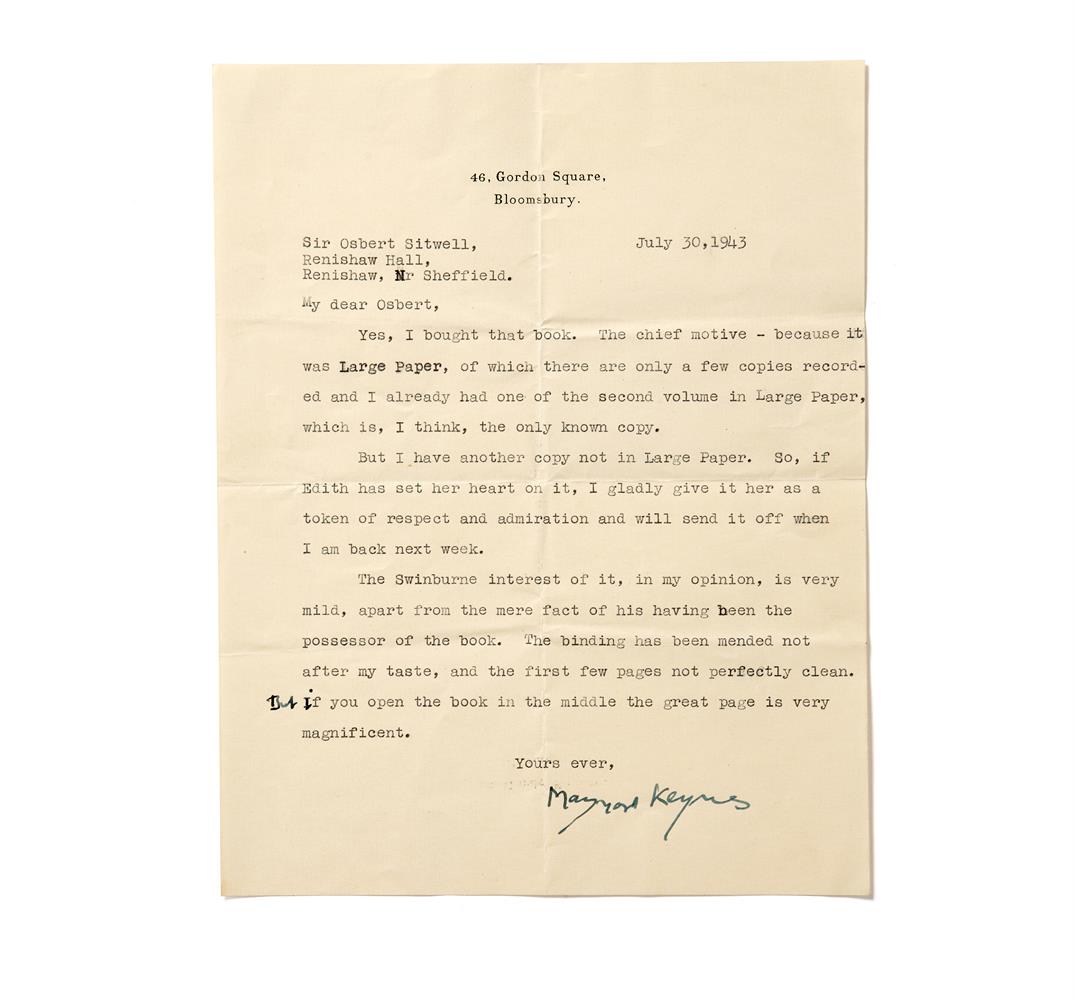Keynes (John Maynard)
THE GENERAL THEORY OF EMPLOYMENT, INTEREST AND MONEY
Published: MacMillan and Co., London, 1936
Edition: First Edition
First edition: xii, 403 pages, blue cloth slightly bent on the upper cover, titled gilt on the spine, the dust jacket is marked 5 /- on the inside cover, and is faded on the spine with 2 ink smudges on the back cover, light foxing on the title page and on the page edges, a good copy rare in the dust jacket. The General Theory of Employment, Interest and Money of 1936 is the last and most important book by the English economist John Maynard Keynes. It created a profound shift in economic thought, giving macroeconomics a central place in economic theory and contributing much of its terminology – the "Keynesian Revolution". It had equally powerful consequences in economic policy, being interpreted as providing theoretical support for government spending in general, and for budgetary deficits, monetary intervention and counter-cyclical policies in particular. It is pervaded with an air of mistrust for the rationality of free-market decision making. Keynes denied that an economy would automatically adapt to provide full employment even in equilibrium, and believed that the volatile and ungovernable psychology of markets would lead to periodic booms and crises. The General Theory is a sustained attack on the 'classical' orthodoxy of its time. It introduced the concepts of the consumption function, the principle of effective demand and liquidity preference, and gave new prominence to the multiplier and the marginal efficiency of capital. https://en.wikipedia.org/wiki/The_General_Theory_of_Employment,_Interest_and_Money Carter (John) and Muir (Percy) eds. Printing and the Mind of Man no 423 page 254: The worldwide slump after 1929 prompted Keynes to attempt and explanation of, and new methods for controlling the vagaries of the trade cycle. First in A treatise on Money 1930 and later in his General Theory he subjected the definitions and theories of the classical school of economics to a penetrating scrutiny and found them seriously inadequate and inaccurate. In 1936 although Rooseveld's 'New Deal' had utilized Keynesian prescriptions, the General Theory ( on which says the DNB his fame as the outstanding economist of his generation must rest) threw the economists into two opposed camps. Overall Condition: A Good Copy Size: 8vo (230 x 140 mm)
Keynes (John Maynard)
THE GENERAL THEORY OF EMPLOYMENT, INTEREST AND MONEY
Published: MacMillan and Co., London, 1936
Edition: First Edition
First edition: xii, 403 pages, blue cloth slightly bent on the upper cover, titled gilt on the spine, the dust jacket is marked 5 /- on the inside cover, and is faded on the spine with 2 ink smudges on the back cover, light foxing on the title page and on the page edges, a good copy rare in the dust jacket. The General Theory of Employment, Interest and Money of 1936 is the last and most important book by the English economist John Maynard Keynes. It created a profound shift in economic thought, giving macroeconomics a central place in economic theory and contributing much of its terminology – the "Keynesian Revolution". It had equally powerful consequences in economic policy, being interpreted as providing theoretical support for government spending in general, and for budgetary deficits, monetary intervention and counter-cyclical policies in particular. It is pervaded with an air of mistrust for the rationality of free-market decision making. Keynes denied that an economy would automatically adapt to provide full employment even in equilibrium, and believed that the volatile and ungovernable psychology of markets would lead to periodic booms and crises. The General Theory is a sustained attack on the 'classical' orthodoxy of its time. It introduced the concepts of the consumption function, the principle of effective demand and liquidity preference, and gave new prominence to the multiplier and the marginal efficiency of capital. https://en.wikipedia.org/wiki/The_General_Theory_of_Employment,_Interest_and_Money Carter (John) and Muir (Percy) eds. Printing and the Mind of Man no 423 page 254: The worldwide slump after 1929 prompted Keynes to attempt and explanation of, and new methods for controlling the vagaries of the trade cycle. First in A treatise on Money 1930 and later in his General Theory he subjected the definitions and theories of the classical school of economics to a penetrating scrutiny and found them seriously inadequate and inaccurate. In 1936 although Rooseveld's 'New Deal' had utilized Keynesian prescriptions, the General Theory ( on which says the DNB his fame as the outstanding economist of his generation must rest) threw the economists into two opposed camps. Overall Condition: A Good Copy Size: 8vo (230 x 140 mm)

.jpg)













Testen Sie LotSearch und seine Premium-Features 7 Tage - ohne Kosten!
Lassen Sie sich automatisch über neue Objekte in kommenden Auktionen benachrichtigen.
Suchauftrag anlegen